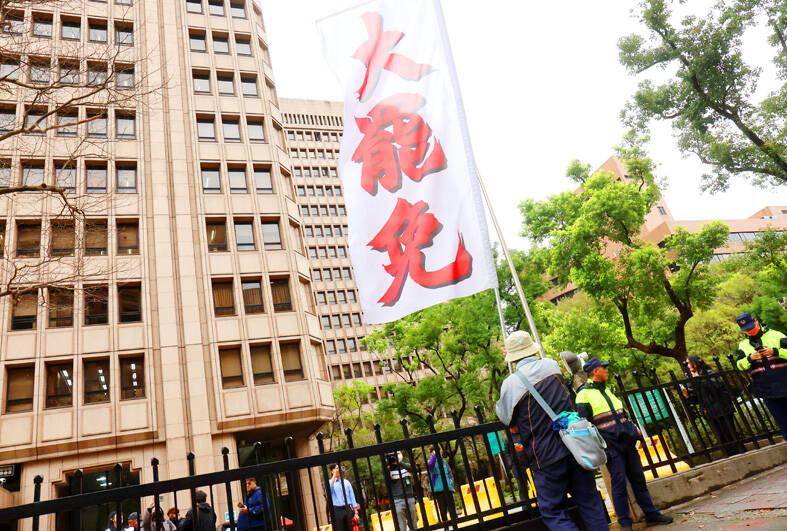Recall campaigns against a Chinese Nationalist Party (KMT) legislator and a blue-aligned independent lawmaker have passed the first stage, with 33 additional KMT representatives potentially facing recall efforts, the Central Election Commission said yesterday,
As of yesterday, recall campaigns against 33 KMT lawmakers, one independent legislator, one city mayor and two county councilors had advanced to the second stage, the commission said.
In the second stage, campaigners must collect signatures from at least 10 percent of voters in the representative’s district within 60 days.

Photo: CNA
The two latest recalls to pass the first phase were against KMT Legislator Chiu Chen-chun (邱鎮軍) and independent Legislator Chen Chao-ming (陳超明), both from Miaoli County.
The first-stage campaigns against 12 Democratic Progressive Party (DPP) lawmakers, led by the KMT Youth League, are still awaiting additional documentation, the commission said, adding that the deadline has not yet passed.
The first phase of recalls advanced against 19 KMT lawmakers, including Wang Hung-wei (王鴻薇), Lee Yen-hsiu (李彥秀), Yeh Yuan-chih (葉元之), Niu Hsu-ting (牛煦庭), Tu Chuan-chi (涂權吉), Lu Ming-che (魯明哲), Wan Mei-ling (萬美玲), Lu Yu-ling (呂玉玲), Chiu Jo-hua (邱若華), Cheng Cheng-chien (鄭正鈐), Yu Hao (游顥), Yen Kuan-heng (顏寬恒), Liao Wei-hsiang (廖偉翔), Huang Chien-hao (黃健豪), Lo Ting-wei (羅廷瑋), Ting Hsueh-chung (丁學忠), Huang Chien-pin (黃建賓), Ma Wen-chun (馬文君) and Fu Kun-chi (傅?萁).
The mayor facing a recall is suspended Hsinchu Mayor Ann Kao (高虹安) of the Taiwan People’s Party, while the two councilors are DPP members from Nantou County, Tsai Ming-hsien (蔡銘軒) and Chen Yu-ling (陳玉鈴).
The second round of approved phase one recalls were for KMT legislators Lin Te-fu (林德福), Chang Chih-lun (張智倫), Yang Chiung-ying (楊瓊瓔), Hung Mong-kai (洪孟楷), Lo Ming-tsai (羅明才), Hsu Chiao-hsin (徐巧芯), Lai Shyh-bao (賴士葆), Liao Hsien-hsiang (廖先翔), Hsu Hsin-ying (徐欣瑩), Lin Szu-ming (林思銘), Johnny Chiang (江啟臣), Lo Chih-chiang (羅智強) and Hsieh Yi-feng (謝衣鳳).

A Taiwanese software developer has created a generative artificial intelligence (AI) model to help people use AI without exposing sensitive data, project head Huang Chung-hsiao (黃崇校) said yesterday. Huang, a 55-year-old coder leading a US-based team, said that concerns over data privacy and security in popular generative AIs such as ChatGPT and DeepSeek motivated him to develop a personal AI assistant named “Mei.” One of the biggest security flaws with cloud-based algorithms is that users are required to hand over personal information to access the service, giving developers the opportunity to mine user data, he said. For this reason, many government agencies and

The National Fire Agency on Thursday said a series of drills simulating a magnitude 8.5 earthquake would be held in September to enhance the government’s emergency response capabilities. Since earthquakes cannot be predicted, only by continuously promoting disaster prevention measures could Taiwan enhance its resilience to earthquakes, agency Director-General Hsiao Huan-chang (蕭煥章) said in a news release. The exercises would be held to mark annual National Disaster Prevention Day on Sept. 21, the aim of which is to test Taiwan’s preparedness and improve its earthquake resilience in case of a major temblor, Hsiao said. As part of those drills, an earthquake alert would

DEFENSE: The National Security Bureau promised to expand communication and intelligence cooperation with global partners and enhance its strategic analytical skills China has not only increased military exercises and “gray zone” tactics against Taiwan this year, but also continues to recruit military personnel for espionage, the National Security Bureau (NSB) said yesterday in a report to the Legislative Yuan. The bureau submitted the report ahead of NSB Director-General Tsai Ming-yen’s (蔡明彥) appearance before the Foreign and National Defense Committee today. Last year, the Chinese People’s Liberation Army (PLA) conducted “Joint Sword-2024A and B” military exercises targeting Taiwan and carried out 40 combat readiness patrols, the bureau said. In addition, Chinese military aircraft entered Taiwan’s airspace 3,070 times last year, up about

STRICTER ENFORCEMENT: Taipei authorities warned against drunk cycling after a sharp rise in riding under the influence, urging greater public awareness of its illegality Taipei authorities have issued a public warning urging people not to ride bicycles after consuming alcohol, following a sharp rise in riding under the influence (DUI) cases involving bicycles. Five hundred and seven people were charged with DUI last year while riding YouBikes, personal bicycles, or other self-propelled two-wheelers — a fourfold increase from the previous year, data released by the Taipei Police Department’s Traffic Division showed. Of these, 33 cases were considered severe enough to be prosecuted under “offenses against public safety,” the data showed. Under the Road Traffic Management and Penalty Act (道路交通管理處罰條例), bicycles — including YouBikes and other